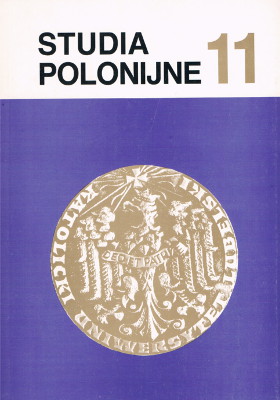Genesis and Activity of the Polish Mission in Paris for the Benefit of Emigration and the Country in 1836-1922
Main Article Content
Abstract
The Mission was established together with the Order of the Resurrection thanks to Bogdan Jański, the founder of the Polish religious revival among Polish emigrants in France following the Polish-Russian war 1830/31. In the first period, it had the character of a religious movement which gathered secular apostles around Jański in 1836 in the house in Notre Dame des Champs 11. It lasted for 6 years because the new congregation did not yet have priests, and there were no eager people among the former chaplains, also capable of running a permanent pastoral care for the national elite abroad. Only the arrival of the first Resurrectionist Edward Duński (7 VI 1842) did in fact initiate permanent services for the Polish community in Paris in the Passion of Christ Chapel of St Roch's church. The sermons were delivered by the Rev. Hieronim Kajsiewicz. Duński and Kajsiewicz solemnized an opening ceremony of the permanent pastoral care by the publishing a leaflet on September 10, 1842 in the said chapel.
From then on it did not interrupt its activity even at the time of the Paris Commune, though very often the pastors changed their residence, or even the places where services were performed. Since 1849 the Mission used for its purposes a separate Church of Assumption which is near the St Honoré 263 bis, where it still has its seat. Moreover, the Resurrectionists together with their secular brothers established and managed the Jan Koźmian boarding school (the hostel for seminarists) from November 1, 1840 in Grenelle 39 and from 1844 the first Polish technical school in Fosses de St Victor 37, from 1845 on the Polish Catholic Bookshop in Seine, St Germain 16 and a few years earlier their own Publishing House for the Catholic works. This House rendered splendid services for the Polish religious culture. It was reinforced mostly by Kajsiewicz and the priests: Piotr Semenenko, Józef Hube, and especially by its head Jełowicki. They were supported by secular brothers: Jan Koźmian, Stefan Witwicki and Walery Wielogłowski, and contributed to the defeat of tovianism of a pseudotheologian A. Towiański among the Polish emigrants. They also contributed to the transplantation of the religious revival into the opressed homeland. The Mission permanently ministered the chapel of the St Kazimierz Institution in the Ivry street and contributed to its enlargement in the Chevaleret street and in Juvissy on the outskirts of Paris. Rev. Hube taught at the Iza Działyńska Institute for Young Ladies (Instytut Panien Izy Działyńskiej). There was the charitable work of the Polish Ladies Charitable Society (Towarzystwo Dobroczynności Dam Polskich). Here, together with lay brothers, permanent care for the sick at home was organized, here also were organized St Vincent's Women Society (Towarzystwo Niewiast św. Wincentego), St Kazimierz' Conference (1859) led by W. Kalinka, Tax Association (Stowarzyszenie Podatkowe), (Bread and Reverence Institution − Instytucja Czci i Chleba) aimed at supporting veterans by the "brotherly tax" and armaments of the Liberators of Poland. Here, was organized the Polish Mission in London which was run (1844, 1847/49 and 1878 − 1880) thanks to Jański's pupils and friends in 1842. There was an Easter retreat organized in the larger centres of Polish exiles in France, Belgium, Germany and Britain. Holiday-makers and patients in Ostenda, hyeres etc. were cared for by the seasonal pastoral care. There was a retreat preached to nuns and priests, Polish sailors and prisoners of war were under religious care, and were prepared for confession and Confirmation. Regular work of the Mission consisted in a modern full-time pastoral care in Paris. There were often Funerals at Montmorency, weddings with speaches at the Assumption Church, blessing of food, distribution of wafers, pastoral visits, visiting the sick and poor, preparing for Sacraments, Polish patrons days and important Church and national anniversaries were celebrated. The Mission, thanks to the generosity of rich fellow-countrymen from Poland assisted many exiles, especially clergy outcasts from uprisings. After Jański and Duński there were the following rectors of the Mission: Rev. H. Kajsiewicz (1842-1845 and formally 1848-1850), Rev. J. Hube (1845-1848), Rev. Karol Kaczanowski (ad interim 1848-1850), Rev. A. Jełowicki (1850-1877), Rev. Władysław Witkowski (1877-1892), Rev. Karol Grabowski (1893-1895), Rev. Władysław Orpiszewski (1895-1904) and Rev. Leon Postawka (1904-1922) who was the first non-Resurrectionist.

